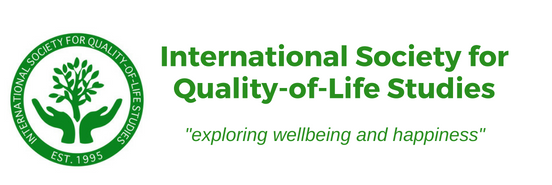Workshop Title:
The importance of collaboration between policy makers and research networks to achieve sustainable quality of life and well-being
Instructors: Dr. Graciela Tonon and Enrique Delamonica
Date and Time: Monday 21 July, 1:00pm-4:00pm
Location: University of Luxembourg (room TBA)
Fee:
-
$35 USD (ISQOLS Members)/$20 USD (Student, Retired, Developing Country ISQOLS Members);
-
$50 USD (Non-ISQOLS members)/$35 USD (Student, Retired, Developing Country non-ISQOLS Members)
Workshop Description:
The transfer of quality of life and well-being research results to the field of policy making may facilitate decision making and improve the population’s quality of life and well-being. Against this background, it is of particular interest to examine the role of the actors involved in the process. Researchers and policy makers have a different idea of what knowledge is. Researchers view knowledge theoretically and methodologically, while policymakers view it as the result of experience. The twenty-first century has seen an expansion in the construction of international collaborative networks in the field of production of knowledge, involving researchers from different regions and countries. In this sense we can say that a fundamental change is occurring in the geography of science, as research networks are expanding in all regions of the world. In this way, knowledge is better transferred and combined through collaboration, as co-authored articles are easily available and cover many countries and disciplines. The conjoint process between policy makers and researchers, this is to say between the fields of public policies and research networks, make possible the integration of perspectives and involves a process of co-design and creation in a collaborative way between the actors of the process. If quality of life and well-being research results are included in policy making, they can make a significant contribution to the design and implementation of public policies. In this way, the quality of life and well-being of the population could be improved and better, fairer societies with fewer inequalities could be built. This workshop is organized in three parts. In the first one we will explain the main concepts theoretically and debate the topics with the participants. In the second part, participants will work in groups to build proposals to facilitate the dialogue between policymakers and quality of life and well-being researchers, for the construction of public policies. Finally, the working groups will present their work, which will be debated to reach a conclusion.
Workshop Instructors:
Graciela Tonon has a Ph.D. in Political Science (USAL, Argentina), Magister in Political Sciences (UNSAM, Argentina) and Bachelor Social Work. She did Postdoctoral studies at the University of Firenze, Italy. She is Full Professor of Community Social Work and Children at Risk and Director of the Social Institute of Social Sciences UNI-COM at the National University of Lomas de Zamora. She is also Professor of Social Science Research Methodology and Quality of Life and Happiness and the Director of the Research Center in Social Sciences at the University of Palermo, Argentina. She received the ISQOLS Distinguished Service Award for Contributing Substantially to a Better Understanding of Quality-of-Life Studies in 2016. She is Editor of the International Quality of Life Handbook Series, Springer-ISQOLS;https://www.springer.com/series/8365/editors ; Associate Editor of Applied Research in Quality of Lifehttps://link.springer.com/journal/11482/editors ; Editor Collection Overcoming Youth Inequalities in the 21st Century: Public Policies and Methodology, Discover Global Societyhttps://link.springer.com/collections/dhbbaajcca ; Director of the Journal de Ciencias Sociales University of Palermo, Argentina.https://dspace.palermo.edu/ojs/index.php/jcs/about/editorialTeam. She has published extensively in English and Spanish: 31 books, 101 book chapters and 72 scientific articles. Currently she is Member of the Board of Directors of the International Society for Quality-of-Life Studies (ISQOLS) (2025-2026) member since 2000; Fellow of the Human Development and Capability Association (HDCA) (2013-2029) and Network Co-coordinator and past Secretary, and member of the Children Understanding of Well-being Network (CUWB) since its origin in 2015. She is also member of the Argentine Olympic Committee. She has directed 42 research projects, 83 researchers, 12 doctoral theses, 9 master's theses and 6 post-doctoral fellows. She has participated as a speaker and panelist in 394 Conferences: 231 internationally and 163 nationally. Her fields of interest are Human capabilities, Quality of Life, Research Methodology, Young people, Children, Community, Inequalities, Public Policy. ORCID: https://orcid.org/0000-0003-1892-7958
Enrique Delamonica is the Senior Adviser Statistics and Monitoring for Child Poverty and Gender Equality in UNICEF. He is an economist and political scientist educated at the University of Buenos Aires, the Institute for Economic and Social Development, Columbia University, and the New School for Social Research. He was a policy analyst at UNICEF’s Headquarters, the Social and Economic Policy Regional Advisor at UNICEF’s Office for Latin America and The Caribbean, and the Chief of Social Policy and Gender Equality at UNICEF Nigeria. Throughout these years, he has focused on poverty reduction and human development strategies, social protection, socioeconomic disparities, child poverty, financing social services, equity, and the impact of macro-economic trends on child welfare. He has written and co-edited books and articles on economic development, children’s rights, social protection, macroeconomic trends impacting on children, socioeconomic disparities, the green economy, quality of life, social exclusion and discrimination, and financing social services - always focused on improving the lives of children, adolescents, and their families. He has also taught economics, international development, policy analysis, statistics, and research methods at, among other places, New York University, Columbia University, the New School for Social Research, and Saint Peter’s College (New Jersey). He was a Fellow of the Comparative Research Program on Poverty of the International Social Science Council between 2010 and 2018. Currently he is an ISQOLS member and member of the board of the Research Committee on Poverty, Social Welfare and Social Policy of the International Sociological Association.
